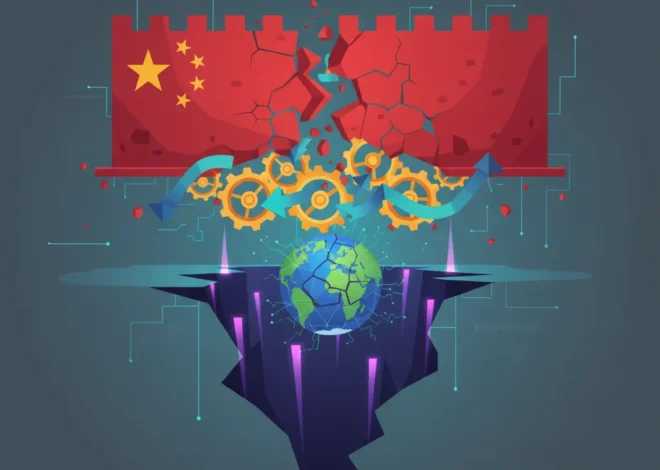
Caught in the Crossfire: China’s New Sanctions Signal a Wider Economic War
The intricate dance of global geopolitics has taken a sharp, unsettling turn. In a move that sends ripples across the international economy, Beijing has expanded its economic arsenal, targeting not just its primary rival, the United States, but one of its key allies. China recently slapped sanctions on several companies, most notably South Korea’s HD Hyundai Heavy Industries (HHI), a titan in the global shipbuilding industry. This action, accusing the company of aiding Taiwan, marks a significant escalation in the ongoing trade and technology war between Washington and Beijing.
This isn’t merely a diplomatic spat; it’s a calculated move that drags third-party nations and their corporate champions directly into the line of fire. For investors, business leaders, and anyone involved in international finance, this development is a critical signal. The era of predictable global trade is over, replaced by a new reality where supply chains, investments, and corporate strategies must be viewed through a geopolitical lens. The fallout from this single action will impact everything from the stock market to long-term investing strategies, fundamentally altering the risk calculus for multinational corporations.
The Shot Across the Bow: Unpacking Beijing’s Sanctions
On May 20, 2024, China’s Ministry of Commerce placed several US defense contractors and one prominent South Korean company on its “unreliable entity list.” The list, a direct response to similar US measures, effectively blacklists firms from the Chinese market. The sanctions against HD Hyundai Heavy Industries are particularly noteworthy. According to Beijing, the company was targeted for its involvement in Taiwan’s indigenous submarine program, a project viewed by China as a direct challenge to its sovereignty claims over the island.
The measures are severe:
- A ban on any trade activities related to China.
- A prohibition on any new investments in China.
- Senior executives are barred from entering the country.
While HHI has stated its direct business in China is minimal, the symbolic weight of this action is immense. As reported by the Financial Times, this is the first time a non-US company from a treaty-allied nation has been so explicitly targeted in this manner. It’s a clear warning shot to other nations and corporations: neutrality is no longer an option. Picking a side in the US-China rivalry now comes with tangible economic consequences.
This strategic move is a classic example of economic statecraft, where trade and finance are weaponized to achieve political objectives. By sanctioning a major South Korean conglomerate, China is not only attempting to punish support for Taiwan but also testing the strength of the US alliance network in Asia. It forces Seoul into an uncomfortable position, caught between its most important security partner, the United States, and its largest trading partner, China.
A Widening Battlefield: From Bilateral Spat to Global Confrontation
For years, the US-China trade war has been the dominant narrative in global economics. It began with tariffs and has since escalated into a fierce competition over advanced technologies, from semiconductors to artificial intelligence. Both nations have deployed powerful economic tools to hinder the other’s progress. The US has used its Entity List to restrict companies like Huawei’s access to American technology, citing national security concerns. China, in turn, has developed its own countermeasures, including the unreliable entity list.
The sanctioning of HHI represents a new, more complex phase of this conflict. It demonstrates China’s growing confidence in wielding its economic power beyond its borders, a practice known as implementing “secondary sanctions.” This tactic aims to deter third parties from doing business with a primary target—in this case, anyone supporting Taiwan’s defense capabilities. According to a Reuters report, the list also included US firms like General Atomics Aeronautical Systems and General Dynamics Land Systems, but the inclusion of a Korean firm is what truly changes the game.
This expansion of the conflict zone has profound implications for global supply chains. The “just-in-time” manufacturing model, which powered decades of globalization, is predicated on stability and open trade. Now, businesses must contend with the risk of being suddenly cut off from key markets or suppliers due to political decisions made thousands of miles away. This uncertainty is a tax on efficiency and a major headache for corporate strategists and those involved in international trading.
The Investor’s Dilemma: Navigating a Fractured Financial World
For those in finance and investing, these developments necessitate a significant strategic pivot. The stock market, which abhors uncertainty, reacts swiftly to such news. While the direct impact on HHI’s stock may be contained, the broader chilling effect on companies with similar profiles is real. How can investors navigate this new landscape?
First, geopolitical risk analysis must become a central pillar of any investment thesis. It’s no longer enough to analyze a company’s financials and market position. Investors must now ask:
- Where does this company operate?
- Where are its key suppliers and customers located?
- How exposed is it to the US-China rivalry?
- Does it operate in a sector deemed “strategic” by either Washington or Beijing?
Second, the concept of “friend-shoring”—realigning supply chains to be within the borders of allied nations—is moving from theory to practice. While this can create more resilient supply chains, it often comes at a higher cost, which can impact corporate profits and inflation. This trend creates both risks for established companies and opportunities for new players in “friendly” jurisdictions like Mexico, Vietnam, or Eastern Europe.
The role of financial technology (Fintech) and regulatory technology (RegTech) is also becoming more critical. Financial institutions and global corporations rely on sophisticated software to screen transactions and ensure compliance with a dizzying web of international sanctions. As these regimes become more complex and extraterritorial, the demand for advanced compliance solutions, potentially even leveraging AI, will skyrocket. The banking sector is on the front lines, tasked with enforcing these financial blockades while managing immense operational risk.
Below is a summary of the entities recently added to China’s “unreliable entity list” in this wave of sanctions, highlighting the international scope of the action.
| Company | Country | Stated Reason for Sanction | Potential Business Impact |
|---|---|---|---|
| HD Hyundai Heavy Industries | South Korea | Alleged involvement in Taiwan’s submarine program. | Symbolic damage; potential loss of future (though currently minimal) China-related business; increased scrutiny from investors. |
| General Atomics Aeronautical Systems | USA | Arms sales to Taiwan. | Directly targeted by China’s blacklist, prohibiting trade and investment. Primarily impacts non-defense business lines. |
| General Dynamics Land Systems | USA | Arms sales to Taiwan. | Similar to General Atomics, facing a ban on China-related business activities and investment. |
| Boeing Defense, Space & Security | USA | Arms sales to Taiwan (sanctioned previously, but part of the same trend). | Faces significant pressure, as its commercial aviation division has huge interests in the Chinese market. (source) |
The Path Forward: A New Era of Economic and Technological Competition
China’s sanction against a South Korean firm is more than a single event; it’s a paradigm shift. It signals that the gloves are off and that economic coercion will be a primary tool in geopolitical disputes for the foreseeable future. This raises critical questions about the future of global governance and the international trading system, which was built on principles of free and open exchange.
This environment may accelerate the development of alternative systems. For instance, discussions around the use of blockchain for supply chain management are gaining traction. A decentralized, transparent ledger could, in theory, help companies verify the origin of components and navigate complex trade restrictions, though its widespread implementation remains a distant prospect. Similarly, we may see the emergence of parallel financial systems and technology stacks, one aligned with the US and its allies, and another centered around China.
For businesses, the key to survival and success will be resilience and adaptability. This means diversifying supply chains, hedging against currency and political risks, and investing heavily in compliance and risk management. For investors, it means looking beyond the quarterly earnings report and understanding the complex geopolitical currents that can sink even the most seemingly stable corporate ship.
The world is entering a period of sustained geopolitical and economic competition. The sanction on HD Hyundai Heavy Industries is a clear sign that no country and no major corporation is immune. The stability that underpinned the global economy for the past three decades is fracturing, and in its place, a more volatile and unpredictable landscape is emerging. Success in this new era will belong to those who can anticipate these shifts, understand the deep-seated forces driving them, and build strategies that are resilient enough to withstand the shocks to come.


